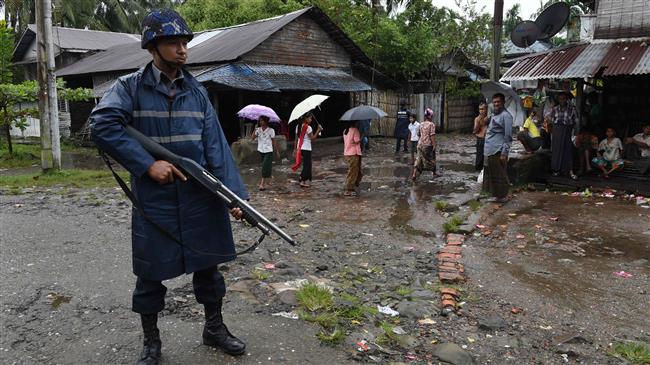
RNA - The Rohingya youth who remain in Myanmar's Rakhine state have faced serious restrictions on access to schooling since the outbreak of violence there in 2012, with children often kept in separate facilities and unable to attend mainstream schools, the Burmese Rohingya Organisation UK (BROUK) said on Thursday, while older students are unable to attend university, Al-Jazeera reported.
In Bangladesh, where more than 700,000 Rohingya now live in sprawling refugee camps after fleeing a brutal Myanmar army crackdown last year, authorities have banned formal education, and even the construction of any structure that might seem like a permanent school building.
As a result, most young people only have the option of attending informal learning centres run by civil society groups.
"Now more than ever, we need educated Rohingya who can act as leaders for the community, but as long as education remains severely restricted this will be impossible," Tun Khin, president of BROUK, said in a statement, adding that "we are facing the prospect of a lost generation".
The mostly Muslim Rohingya are one of the world's most persecuted minorities, attacked and driven out of Rakhine in what United Nations investigators have said remains an"ongoing genocide".
An international law firm hired by the US State Department said earlier this month it had found evidence of genocide in the August 2017 military crackdown that drove the Rohingya into Bangladesh, and urged a criminal investigation into the atrocities.
"Right now, Rohingya are not getting any kind of formalised education in the camps," John Quinley, a human rights specialist with Fortify Rights in Bangladesh's Cox's Bazar, where the refugee camps are located, told Al-Jazeera, noting, "This is a big concern for future generations of Rohingya. We are talking about lots of children who are unable to access education."
Education in the 27 camps around Cox's Bazar is provided by international and local NGOs as well as community-based organisations, and quality depends on who is running the centre.
The report, titled The Right to Education Denied for Rohingya Refugees in Bangladesh, noted that what classrooms existed were often overcrowded and poorly resourced. Many of the learning centres were located in refugees' own shelters, it noted.
Years of discrimination in Rakhine itself, "an apartheid state" according to Fortify Rights' Quinley, had made the recruitment of teachers a serious challenge.
BROUK said of the teachers who arrived initially in August last year, only 21 percent had education beyond the secondary level while the segregation in Rakhine meant that Rohingya teachers were not allowed to travel and were therefore unable to access government-run teacher training programmes.
UNICEF, which has been heavily involved in the provision of education in the camps, admitted in an August report that there were "inescapable" challenges in addressing the issue.
"Without an agreed and approved curriculum, children were taught with a variety of materials," the UN agency for children stated, adding that "so enthusiastic were the children to learn that classrooms were often over-crowded".
BROUK announced that while aid groups had made "heroic efforts" to respond to the crisis there had been little long-term planning in relation to education, while prioritising primary over secondary education had created a shortage of opportunities for teenagers.
By July 2018, approximately 1,200 learning centres were operating while almost 140,000 Rohingya children had been enrolled in non-formal education of some kind, according to UNICEF.
BROUK noted that more than 150,000 children remained excluded from any kind of education, particularly those between the ages of 15 and 18.
UNICEF announced that it was developing a Learning Competency Framework and Approach (LCFA) to address some of the problems faced by school-age Rohingya.
The LCFA aims to double the amount of contact time for each child from the current two hours of teaching a day, expand classes for older children and teach in the languages used by the Rohingya including English, Burmese and local dialects.
According to BROUK, any solution required the involvement of the community who had been "largely absent" from any decision-making on education.
"It is essential to both the access and acceptability of education that communities have the freedom to establish their own schools - with the curriculum and language of their choosing," the group's report said, adding, "While politically unpopular - such permissions should acknowledge the reality and potentially protracted nature of the situation."
BROUK urged authorities in Bangladesh to remove all barriers on Rohingya refugees access to education and reiterated its call for the Myanmar government to address the hurdles facing the minority in their homeland.
"The only long-term and viable solution to the crisis lies inside Myanmar," the report said, noting that "the Myanmar authorities must immediately remove all restrictions on the human rights of Rohingya (including on access to education and freedom of movement), and grant Rohingya citizenship under national law".
A November plan to start the repatriation of Rohingya to Myanmar fell apart after the refugees refused to leave.
The repatriation, agreed at the government level without the input of the Rohingya themselves, has been postponed indefinitely.
847/940